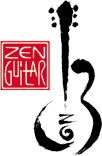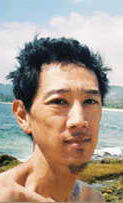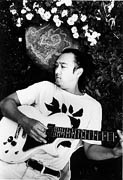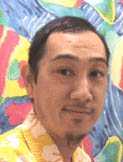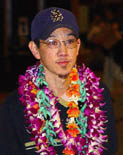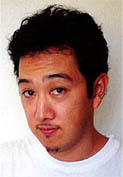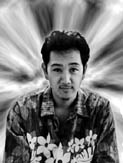Slow Days and a Mother's Love
October 16, 2001
They say that time flies when you're having fun. I can attest
to the converse being true as well. It's been two weeks now
since I've been released from the hospital, and these have
been some of the longest, slowest days of my life.
A number of people have sent e-mails recently asking why I
haven't posted anything on my cancer journal. The short answer:
I haven't felt like it. In two weeks home I haven't written
anything, haven't picked up the guitar, haven't taken any visitors,
haven't gone out for more than a slow walk around the neighborhood.
Most of the time I've been bedridden, trying to deal with a
combination of pain from the surgery, discomfort from relearning
how to eat, 12 hours a day hooked to a feeding pump, and, last
week, three days of chemotherapy. At times, I've had to reduce
my focus from getting through the day to simply getting through
the next hour.
Four weeks after the surgery, I still hunch over when I stand,
like someone's punched me in the gut. Doctors tell me the pain
from the incision should be gone by now, but my body tells
me otherwise. Eating has proven to be something of a tightrope
act. When doctors removed my stomach, they attached my esophogus
directly to my small intestine. Over time, they say, the intestine
should become more elastic, giving me more capacity to consume
food. But for now, I can eat only a limited amount at one sitting--a
limit, I've found, that has no give whatsoever. With a stomach,
if I ate too much, the stomach would expand to take that extra
in and I'd feel really full. Without a stomach, if I eat just
one bite too many, that bite doesn't go down to my intestine--it
stalls in my esophogus. It's not a comfortable feeling. The
only relief is for me to throw it back up.
Thankfully, I had my mom helping out during the worst of it.
There's nothing like a mother's care when you're sick to help
the healing process along. Lying in bed, knowing she was there
reminded me of my days as a vulnerable child, home from school
with the flu, when she'd nurse me back to health.
Over these last four weeks, she did all the little things--holding
me up as I trudged around the hospital halls for exercise,
my arm over her shoulder for support, my other hand clinging
to my IV tree; propping up my pillow; bringing me hot water
bottles; cooking just the right meal--the embodiment of what
zen teachers call toku. Toku usually translates as virtue,
but more accurately refers to a selfless action that seeks
no reward, like the love that parents shower upon a child to
help it get started in the world. As the child grows it knows
nothing of its parents' sacrifices until years later, when
the child himself becomes a parent and begins making sacrifices
for his own children. Only then does it dawn on him what his
parents gave so many years ago.
As a grown man, here I was, vulnerable again, receiving the
same selfless love my mother gave from the day I was born.
Only this time, as a parent myself, I had the eyes to appreciate
it, marvel at it, and be humbled by it.
If nothing else, may I live long enough to return that love
to her as she grows older, and offer it to my kids years hence
in their hour of adult need.
Love like that needs to get passed on through the ages.
P.S. Thanks, mom. I love you.
>next
|
